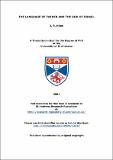The language of Father and the God of Israel
Abstract
Studies of the language of father in the Old Testament have sought to show either the centrality of this locus or its peripheral status. Both tend to work on the basis of a Religionsgeschichte approach, striving to situate texts that use father language in a wider Ancient Near Eastern setting. While there is doubtless a relationship between Israel's use of such language and that of antiquity, appeal to the latter serves largely to bring divergent views into bold relief. Language of father is relatively rare in the Old Testament. We indicate where it does appear, and why. The diachronic method is insufficient and word studies are inadequate for the questions, providing only a metaphorical universe of Near Eastern gods and God, which generate such divergent views. Presented here is an accounting of the canon's locus of "God as Father," sensitive to history-of-religion, yet allowing canonical presentation to have its own integrity within the theological universe of the Old Testament. In order to place matters in context, the first section examines the history-of-religion approach and its logical outgrowth in modern feminism. This section also surveys recent Trinitarian defences of father-language for God, viewed essentially as constructive reaction to feminism, but manifesting in itself failure to accord with Old Testament language and to account for Christological issues. The second section examines Hebrew texts that use father-language. The argument follows closely Scripture's order and character. If a history-of-religions approach focuses on evolutionary and non-canonical treatments, what is the alternative? Only when the issue is handled essentially from within can the relative scarcity of the locus, "God as Father," be acknowledged and light be shed on the reasons for the appearance of such language at all and just what it means. The final section offers a prudential statement of how father-language functions in the Old Testament and is meant to function in theological speech. Divine paternity is seen in terms of Israel's election by and covenant relationship with her God rather than primarily in general creation. Due to the existence and centrality of the Hebrew nomen sacrum direct reference to God in father-language was likely held in symbiotic reserve, until in post- exilic time in father became increasingly a metonym for God. It is in this context that Jesus' understanding and use of father-language is explicable.
Type
Thesis, PhD Doctor of Philosophy
Collections
Items in the St Andrews Research Repository are protected by copyright, with all rights reserved, unless otherwise indicated.

